|
|
|
Sort Order |
|
|
|
Items / Page
|
|
|
|
|
|
|
| Srl | Item |
| 1 |
ID:
167951
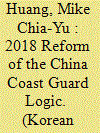

|
|
|
|
|
| Summary/Abstract |
In June 2018, the Chinese government initiated a new round of reforms to reshuffle
the leadership of the China Coast Guard (CCG) so as to better administer the
country’s blue territory. In contrast to the 2013 structural reform of the Chinese
government which created the CCG and made it part of the State Oceanic
Administration, a sub-ministerial organ of the Chinese State Council, the 2018
reform placed the agency under direct command of the Communist Party’s Central
Military Commission. This paper argues that the CCG today has been a formidable
maritime giant and acquired a fair ability to coordinate its patrol operations with
other agencies in recent years. In particular, the maritime law enforcement force
has been made more militarized given its close association with the Chinese
Navy. Nonetheless, despite the notable performance the CCG has made, it still
faces problems of unclear legal status and weak airborne surveillance capabilities,
keeping its institutional reform far from full completion. Moreover, a more
powerful coast guard force can on the one hand facilitate Beijing’s aim to become
a great maritime power but on the other hand lead to more security challenges as a
harsher maritime contest between China and its strategic competitors is likely to be
witnessed in the near future.
|
|
|
|
|
|
|
|
|
|
|
|
|
|
|
|
| 2 |
ID:
126026
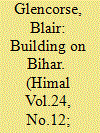

|
|
|
|
|
| Publication |
2011.
|
| Summary/Abstract |
Poor infrastructure, weak human capacity, politicised local bureaucracies, difficult caste relations, debilitating power shortages and deeply entrenched poverty - driving around Bihar recently, it was clear that the state has yet to transform into the orderly, prosperous society that recent press coverage has suggested. That said, there is no doubt that a nascent but carefully structured institutional reform process is allowing for the slow emergence of a 'naya' Bihar. Since 2005, the government of Nitish Kumar has consolidated rule of law, built critical infrastructure, begun to deliver services, increased revenues and expenditures, improved bureaucratic functionality, and generated an important sense of citizenship among many of the state's communities. The economy has grown at over 10 percent per year for the past six years, despite the separation of resource-rich Jharkhand in 2000, periodic floods and droughts, and the recent global financial crisis.
|
|
|
|
|
|
|
|
|
|
|
|
|
|
|
|
| 3 |
ID:
162353
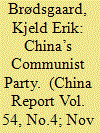

|
|
|
|
|
| Summary/Abstract |
The Communist Party of China (CPC) is not withering away as predicted by some Western scholars. On the contrary, in recent years, the party has centralised and strengthened its rule over China. At the same time, party membership has changed. Today, workers and farmers only account for only one-third of the total party membership compared to two-thirds when the People’s Republic of China (PRC) was established. Instead, new strata and groups such as technical and management personnel have evolved. The composition of the party’s cadre corps has changed accordingly, and cadres today are younger and much better educated than during Mao’s time. The leading cadres form an elite which is at the heart of a ranking-stratified political and social system. This article discusses how the CPC has evolved from a mass to an elite party. It argues that in this process, the party has taken over the state resulting in a merger and overlap of party and government positions and functions, thereby abandoning Deng Xiaoping’s ambidextrous policy goals of separating party and government. Centralisation and reassertion of ranking-stratified party rule is Xi Jinping’s answer to the huge challenges caused by the economic and social transformation of Chinese society—not a return to Mao’s mass party.
|
|
|
|
|
|
|
|
|
|
|
|
|
|
|
|
| 4 |
ID:
111481


|
|
|
|
|
| Publication |
2012.
|
| Summary/Abstract |
This article seeks to develop a conceptual and policy framework for understanding China's role in the global economic imbalances. China's contribution to these imbalances via recurrent trade and financial surpluses corresponds with a phase of deepening structural risks to China's economic growth and development. These structural challenges include: the composition of growth resulting from China's dynamic internal transformation, China's trade orientation, the trajectory of resource use and CO2 emissions, welfare problems relating to distribution and international constraints. This article develops a conceptual framework for examining the relationship between the processes of long-run structural transformation in China, its economic imbalances, and the role of institutional reform in dealing with these structural challenges. As such, economic policy should extend beyond short-term macro management to pursue an institutional reform agenda to facilitate broader structural change to mitigate constraints to future growth and to improve economic welfare.
|
|
|
|
|
|
|
|
|
|
|
|
|
|
|
|
| 5 |
ID:
141646


|
|
|
|
|
| Summary/Abstract |
Why do political actors undertake reforms that constrain their own discretion? We argue that uncertainty generated by political competition is a major driver of such reforms, and test this argument using subnational data on Mexican states’ adoption of state-level access to information (ATI) laws. Examining data from 31 Mexican states plus the Federal District, we find that more politically competitive states passed ATI laws more rapidly, even taking into account the party in power, levels of corruption, civil society, and other factors. The fine-grained nature of our data, reflecting the staggered timing of elections, inauguration dates, and dates of passage, allows us to distinguish between different theoretical mechanisms. We find the greatest evidence in favor of an insurance mechanism, by which incumbent parties who face uncertainty over future political control seek to ensure access to government information, and means of monitoring incumbents, in the future in case they lose power.
|
|
|
|
|
|
|
|
|
|
|
|
|
|
|
|
| 6 |
ID:
090977


|
|
|
|
|
| Publication |
2009.
|
| Summary/Abstract |
The attempt of the Georgian government to reform and restructure its military forces in the past ten years demonstrates the difficulty of conducting Western-style defense reform in postconflict states, which have not seen a formal end to armed conflict. Western-style reforms were intended to bring Georgia greater peace, stability, and accountability, with the added benefit of training additional soldiers to support regional peacekeeping operations. Domestic political imperatives within Georgia, however, demanded that the government restore the territorial integrity of the state by "reintegrating" South Ossetia, Abkhazia, and Adjara. In this context, additional organizational and doctrinal interoperability of Georgian forces was desirable, but only to the extent that it enabled Georgian forces to meet these primary domestic political requirements. For Georgia, a country with a weak military tradition and unresolved domestic conflicts causing political controversy at home, military reform was not just an abstract step toward democracy but a potential means to an end of resolving those same conflicts by force or threat of force.
|
|
|
|
|
|
|
|
|
|
|
|
|
|
|
|
| 7 |
ID:
108795
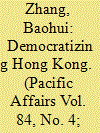

|
|
|
|
|
| Publication |
2011.
|
| Summary/Abstract |
The system of functional representation constitutes the greatest challenge to political reform in Hong Kong. Utilizing recent developments in institutional and ideational theories in political science, this article explores how both power and ideas shape the politics of reforming functional representation. The impasse generated by the current balance of power has given rise to a plethora of ideas that seek to reform the system while preserving its place in the political process. However, recent direct negotiations between Beijing and moderate democrats in Hong Kong have triggered a significant political realignment. This shift in the political balance of power has generated new scenarios for the reform of functional representation.
|
|
|
|
|
|
|
|
|
|
|
|
|
|
|
|
| 8 |
ID:
152163
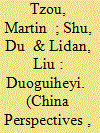

|
|
|
|
|
| Summary/Abstract |
Chinese urban planning has recently begun an institutional revolution that seeks to integrate plans drawn up by several ministries. Aimed at giving more coherence to public action, the process of integration, already technically complex, is confronted with a power struggle between administrations, making duoguiheyi difficult to implement.
|
|
|
|
|
|
|
|
|
|
|
|
|
|
|
|
| 9 |
ID:
176204


|
|
|
| 10 |
ID:
075473


|
|
|
|
|
| Publication |
2006.
|
| Summary/Abstract |
In the aftermath of the economic crisis of 1997-1998 South Korea undertook a number of reforms in financial supervision. Questions have been raised, however, as to whether Korea has in fact succeeded in creating a system of financial supervision capable of dealing with certain risks and responding to new challenges. This article examines Korea's recent experience in financial instability resulting from misconduct by credit card companies as a case in point and argues that the postcrisis reform in financial supervision was limited to changing formal institutions for financial supervision and that further reforms will have to be undertaken in other related institutions if Korea is to improve its financial supervision.
|
|
|
|
|
|
|
|
|
|
|
|
|
|
|
|
| 11 |
ID:
117734
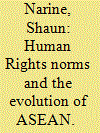

|
|
|
|
|
| Publication |
2012.
|
| Summary/Abstract |
In recent years, ASEAN has implemented numerous organizational reforms that are designed to rejuvenate its institutional structures and international reputation. Among these reforms has been the introduction of the ASEAN Intergovernmental Commission on Human Rights (AICHR). This body is meant to monitor and promote human rights norms and practices among the ASEAN states. It has been criticized, however, as lacking the power to force state compliance. This paper argues that ASEAN's apparent willingness to entertain a more robust institutional human rights regime is properly understood as part of its effort to rehabilitate the organization's international credibility as opposed to an indication of a substantive normative shift in the outlook of key ASEAN members. The paper examines the circumstances around the creation of the AICHR and considers the ongoing state-building problems faced by most ASEAN states. It argues that the AICHR is the product of an inadequate planning process and that the international human rights environment is changing in ways that will relieve the pressure on ASEAN to reform in a manner that reflects the rhetorical preferences of the Western world on the issue of human rights.
|
|
|
|
|
|
|
|
|
|
|
|
|
|
|
|
| 12 |
ID:
084185


|
|
|
|
|
| Publication |
New Delhi, Penguin Books, 2008.
|
| Description |
vii, 230p.hbk
|
| Standard Number |
9780670082629
|
|
|
|
|
|
|
|
|
|
|
|
Copies: C:1/I:0,R:0,Q:0
Circulation
| Accession# | Call# | Current Location | Status | Policy | Location |
| 053948 | 954/SAN 053948 | Main | On Shelf | General | |
|
|
|
|
| 13 |
ID:
116141


|
|
|
| 14 |
ID:
117939
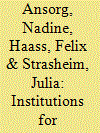

|
|
|
|
|
| Publication |
2013.
|
| Summary/Abstract |
IN DIVIDED SOCIETIES, CHARACTERIZED BY AN ANTAGONISTIC SEGMENTATION
among identity groups, formal state institutions are of paramount importance in regulating intergroup conflict. Institutional reform is thus an
appealing option to shape such state institutions-the system of government, electoral systems and party regulations, territorial state structure, the
judiciary, and the security sector-in order to promote sustainable peace
and prevent the occurrence or recurrence of violent conflict. However,
research is far from having arrived at a consensus about what institutions
work where and how. Is the choice of institutional design in a postwar situation determined at all by expected political utility? What distinguishable
effects can different designs have under what conditions? How do institutions interact-what role does the "concert of institutions" play in the
impact on sustainable peace?
|
|
|
|
|
|
|
|
|
|
|
|
|
|
|
|
| 15 |
ID:
181522
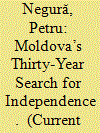

|
|
|
|
|
| Summary/Abstract |
Unlike in the Baltics, support for independence in Moldova was relatively low among the political elites and the general population when the Soviet Union collapsed. In the 1990s, the political parties in power pursued an incoherent program, as governments swung between reformist and conservative agendas. Economic crises and systemic corruption depleted citizens’ trust in politicians and state institutions. This low institutional trust has hampered governance at all levels, and primarily in crises such as the COVID-19 pandemic.
|
|
|
|
|
|
|
|
|
|
|
|
|
|
|
|
| 16 |
ID:
146377
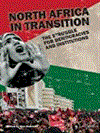

|
|
|
|
|
| Publication |
London, International Institute for Strategic Studies, 2015.
|
| Description |
155p.pbk
|
| Series |
Adelphi Series; 452
|
| Standard Number |
9781138653351
|
|
|
|
|
|
|
|
|
|
|
|
Copies: C:1/I:0,R:0,Q:0
Circulation
| Accession# | Call# | Current Location | Status | Policy | Location |
| 058754 | 320.961/FIS 058754 | Main | On Shelf | General | |
|
|
|
|
| 17 |
ID:
115123


|
|
|
|
|
| Publication |
2012.
|
| Summary/Abstract |
Founded in response to the 1973 oil shock, the International Energy Agency (IEA) is arguably still the most important multilateral organization for energy-importing countries. Yet, the global geopolitical landscape has changed considerably since the IEA's creation. The rise of new energy consumers, new energy-related challenges and new international energy forums prompt a rethink of the agency's current role and institutional design. This article seeks to contribute to the recent debate on the future role of the IEA by examining specific drivers, avenues and constraints for institutional reform. The method used is SWOT analysis, which allows to summarize the key factors emanating from an assessment of an organization's internal characteristics (strengths and weaknesses) and its external environment (opportunities and threats). Building on this SWOT analysis, the article formulates a strategy for the IEA to remain the focal point in global energy governance. Key elements of this strategy include: stronger engagement with new consumers, rapprochement with OPEC, becoming a leading voice in the energy transition, and changing the agency's internal governance practices.
|
|
|
|
|
|
|
|
|
|
|
|
|
|
|
|
| 18 |
ID:
113104


|
|
|
|
|
| Publication |
2012.
|
| Summary/Abstract |
This article explores the relationship between the concept of 'organized hypocrisy' and institutional reform in UN peacekeeping. It first demonstrates how the organized hypocrisy in exit strategies arose from the discrepancy between rhetoric, peacekeeping mandates and actions in the field. The analysis then shows how, as a response to organized hypocrisy, peacebuilding replaced the election-based approach of exit strategies from the early 1990s. By evaluating the institutionalization of peacebuilding, the study reveals the hypocritical potential of reform; complex mission mandates, as well as the Peacebuilding Commission, exhibit elements of counter-coupled organized hypocrisy and meta-hypocrisy that remain unresolved.
|
|
|
|
|
|
|
|
|
|
|
|
|
|
|
|
| 19 |
ID:
088392
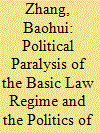

|
|
|
|
|
| Publication |
2009.
|
| Summary/Abstract |
The present constitutional system of Hong Kong is supposedly executive-led. In reality, it is a system of "disabled governance." This article uses recent institutional theories to reveal the weaknesses of the Basic Law regime. It contends that if Hong Kong democratizes under the Basic Law institutional framework, it will not be able to promote good and effective governance
|
|
|
|
|
|
|
|
|
|
|
|
|
|
|
|
| 20 |
ID:
120871


|
|
|
|
|
| Publication |
2013.
|
| Summary/Abstract |
Governmental preferences are crucial to our understanding of European and international treaty reforms. Nevertheless, current research fails to explain why and under what circumstances governments prefer certain proposals for institutional reform. The present article analyzes the conditional nature of governmental reform preferences over different dimensions of institutional design. In doing so, it integrates endogenous and exogenous explanations for governmental reform preferences into a single theoretical framework. The longitudinal research design enables an explicit empirical analysis of the observed short-term changes in the governments' positions on European treaty reforms. In terms of political integration, these changes not only represent short-term trends in public opinion but also reflect the partisan composition of governments and parliaments. Both causal effects are mediated by the institutional design of the domestic preference aggregation process. With respect to institutional reforms, the governments' changing positions can be explained as a reaction to previous treaty reforms. Given a particular level of political integration, governments optimize the trade-off between decision-making power and efficiency. Hence, I find that preferences on political integration and institutional reform are conditional upon each other, with the direction and strength of this conditionality varying systematically across member states and changing over time.
|
|
|
|
|
|
|
|
|
|
|
|
|
|
|
|
|
|
|
|
|